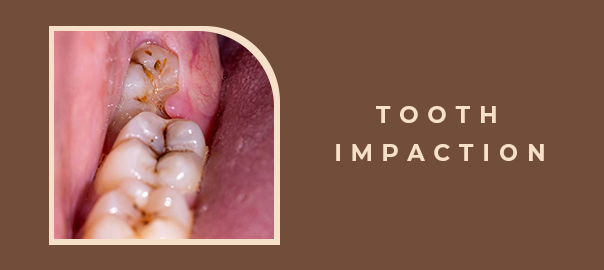
Tooth Impaction – Symptoms, Causes, Treatment
Tooth impaction is a common dental condition where a tooth fails to emerge fully through the gums. If left untreated, this can lead to discomfort, pain, and potential complications. Understanding the symptoms, causes, and treatment options for tooth impaction is crucial for maintaining oral health.
Symptoms of Impacted Tooth
- 1. pain and discomfort in the affected area.
- 2. Swelling and tenderness of the gums.
- 3. Sensitivity.
- 4. Difficulty in opening the mouth.
- 5. Persistent bad breath.
- 6. Unpleasant taste in the mouth.
- 7. Difficulty in chewing or biting.
- 8. Pericoronitis (in some cases)
Causes of Tooth Impaction
- 1. Lack of space in the jaw: Sometimes, there isn’t enough room for a tooth to emerge correctly.
- 2. Genetics: Certain individuals may be predisposed to tooth impaction due to genetic factors.
- 3. Abnormal tooth development: Irregular growth patterns can cause teeth to become impacted.
- 4. Poor dental hygiene: Inadequate oral care can lead to overcrowding and increase the risk of tooth impaction.
- 5. Trauma to the mouth: Injury or trauma to the jaw area can disrupt normal tooth eruption.
Treatment Options for Tooth Impaction
- 1. Extraction: Extraction may be necessary if the impacted tooth is causing pain or affecting oral health.
- 2. Orthodontic treatment: Orthodontic techniques such as braces or aligners may create space in the jaw and encourage proper tooth eruption.
- 3. Surgical intervention: Surgical procedures such as tooth exposure or orthodontic surgery may be required to assist in tooth eruption for severely impacted teeth.
- 4. Pain management: Over-the-counter pain relievers or prescription medications may be recommended to alleviate discomfort associated with tooth impaction.
Conclusion
Tooth impaction can cause significant discomfort and may lead to complications if not addressed promptly. Impaction is most common in wisdom teeth as compared to others and can be diagnosed in a routine checkup. Recognizing the symptoms, understanding the causes, and seeking appropriate treatment from a qualified dental professional are essential steps in managing this condition and maintaining oral health. If you suspect you may have a tooth impaction, don’t hesitate to consult with your dentist for proper evaluation and treatment.
DISCLAIMER:Please note that the prices mentioned on this page: (a) present a range (depending upon the severity of the dental condition, the technology used in treatment, type of dental products used, etc.); (b) are true as on the date of this page and may change on a later date, in accordance with the standard company policy; (c) may be subject to standard aberrations or generalizations on account of the use of AI in general Google/internet search by you.Leave a Reply
Leave a Reply
Explore More Similar Posts
Explore More Blogs


Leave a Reply